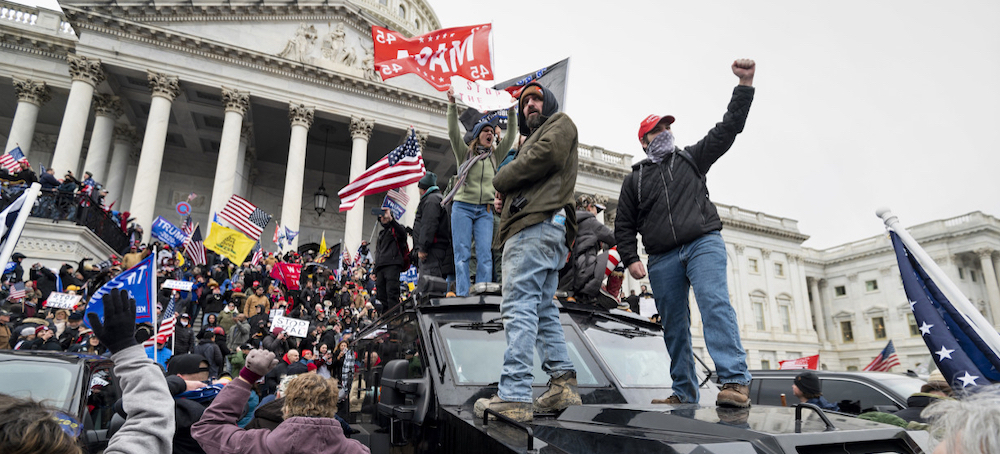Live on the homepage now!
Reader Supported News
Above all, he pledged that the Justice Department has “no higher priority” and would do “whatever it takes for justice to be done — consistent with the facts and the law.” Most important, he made clear that “the Justice Department remains committed to holding all January 6th perpetrators, at any level, accountable under law — whether they were present that day or were otherwise criminally responsible for the assault on our democracy.” (Emphasis mine.)
If Garland means what he says, then the investigative road must lead prosecutors to the individual most responsible for the events of Jan. 6: former president Donald Trump. To be sure, the Justice Department deserves plaudits for what it has done already: More than 725 people have been charged, and 165 have pleaded guilty. Seventy defendants have been sentenced, 31 to prison.
But however guilty they might be, these defendants do not and should not bear the ultimate responsibility for the attack on Congress and the Constitution. As Judge Amit B. Mehta told defendant John Lolos at his sentencing, “I think you are a pawn. You are a pawn in a game that’s played and directed by people who should know better.”
As the pawns meet their fates, the man who led them to try to stop the peaceful, democratic transfer of power remains safe in his Palm Beach palace. As Mehta put it, “People like Mr. Lolos were told lies, falsehoods, told the election was stolen when it really wasn’t.” Those lies were Trump’s.
And not only did Trump deceive the mob, but also he directed it. Trump urged the rioters to come to Washington on Jan. 6, promising it would be “wild!” On that day, he told his supporters to march on the Capitol, to “fight like hell” — and warned that “if you don’t fight like hell, you’re not going to have a country anymore.” He told the crowd that “our country will be destroyed” if Joe Biden took office, and that “we’re not going to stand for that.”
Trump’s intent was obvious well before Jan. 6. I tweeted on Dec. 26, 2020, “It’s pretty clear now that @realDonaldTrump’s next desperate play is to encourage disruption, if not violence, in Washington on January 6.” I wasn’t being prescient; I had just listened to what Trump had been saying. As Rep. Liz Cheney (R-Wyo.) said in announcing her vote to impeach, “The President of the United States summoned this mob, assembled the mob, and lit the flame of this attack.” He did it all in plain sight.
So now the question is, will the Justice Department hold Trump responsible for his role in the attack? If Garland truly means that perpetrators at any level will be held accountable, and that “there cannot be different rules for the powerful and the powerless,” then the department can, it should, and it must.
Garland must not fear that prosecuting Trump would be viewed as a partisan act. He need only look to the words of Senate Minority Leader Mitch McConnell (R-Ky.), who, after voting against an impeachment conviction on the (meritless) ground that Trump had left office, all but called for Trump’s prosecution. “We have a criminal justice system in this country,” McConnell said. “President Trump is still liable for everything he did while he was in office,” McConnell added. “He didn’t get away with anything yet. Yet.”
The Justice Department has plenty of statutory tools available to make sure Trump doesn’t get away with what he did. Most notably, it could invoke one of the same provisions it has applied to individual rioters: Title 18, section 1512(c)(2) of the U.S. Code punishes “whoever corruptly … obstructs … or impedes any official proceeding.” The statute makes clear that an “official proceeding” includes one “before the Congress.” At least one judge handling Jan. 6 cases has already held that it includes Congress’s joint session for counting electoral votes.
That Trump himself wasn’t present at the Capitol doesn’t shield him from liability for obstructing the electoral vote count or for any other crimes committed that day. The criminal code provides that whoever “aids, abets, counsels, commands, induces or procures” the commission of an offense, or “willfully causes … another” to commit an offense, “is punishable as a principal," as though they had directly committed the deed himself.
A number of criminal law experts have noted that you can aid and abet a crime simply by doing nothing — if you have a duty to intervene but don’t. A bystander who watches a store break-in and does nothing hasn’t committed a crime. The store security guard who sees the break-in and does nothing, knowing that his dereliction is allowing the crime to proceed, has.
As president, Trump had the duty to intervene. Instead, as the Jan. 6 select congressional committee is learning, he spent hours watching the mayhem on TV. And that dereliction of duty, along with his open and manifest desire to stop the electoral-vote count, should suffice to make him guilty of a crime. The evidence is already bad for him, and it can only get worse.
If the attorney general means what he says, Trump’s day in the dock will come — if not soon, then soon enough.
Follow us on facebook and twitter!
PO Box 2043 / Citrus Heights, CA 95611


